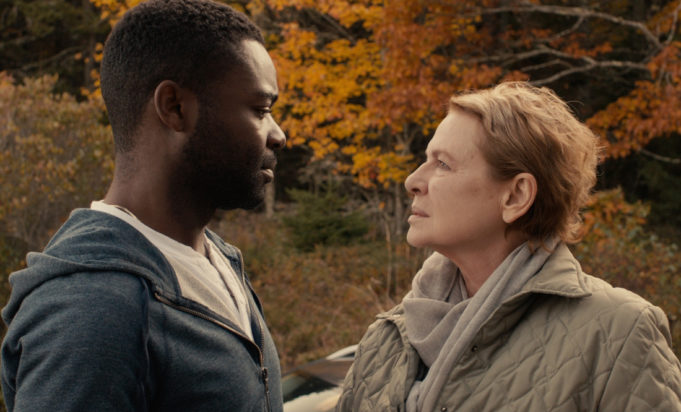Opening this week at AMC Grapevine Mills for a limited run, Five Nights in Maine is a racially charged two-hander of a bereavement drama with one Oscar-winning actress and one actor who was infamously screwed out of an Oscar nomination during one of the Academy’s recent “no actors of color need apply” years. That sounds like a promising recipe, doesn’t it? What a shame that the resulting movie turns out to be such a dud.
David Oyelowo stars as Sherwin, an Atlanta man who receives the news over the phone one evening that his wife Fiona (Hani Furstenberg) has been killed in a car accident. The loss sends him into a spiral of alcohol and depression until he receives an invitation from Fiona’s mother, Lucinda (Dianne Wiest), to spend a few days at her house in rural Maine. This comes as a surprise to him, since Lucinda worked to destroy the marriage when Fiona was alive, but the old woman now suffers from cancer and has no other family left, so she could use the company.
Writer-director Maris Curran comes from a background of making short films, but she seems to have trouble making the proper adjustments to what is her first feature. Curran does give us some flashbacks showing us Sherwin and Fiona’s marriage being less idyllic than it seems when we first see them together — Fiona told her husband and her mom different things about wanting children, and she was having her own troubles with alcohol and depression, which is why Lucinda thinks her daughter’s death wasn’t an accident. Using these details to fill out the story, Curran’s clearly aiming for the sort of film that builds up to a slight shift in perspective rather than a thunderbolt of revelation. There’s a good deal to be said for movies that go for a small-scale approach like this.
The trouble is that there isn’t enough material here even for a satisfying short film. Fiona had a stormy relationship with her own mother and paid a visit to her shortly before her death that noticeably worsened her mood, so why don’t we see any of that? We could have gained some insight into why Fiona was so desperate to escape her New England roots, but we don’t get enough information to form an opinion on that. Chi-Raq’s Teyonah Parris adds little as Sherwin’s concerned sister, and while Rosie Perez reminds us that she can give an understated performance as Lucinda’s caregiver, her character doesn’t have much effect on the plot, either.
Curran doesn’t make nearly enough of the racial angle, either. You’d think that plunking an African-American man down in one of the whitest states in America would generate something interesting, but it doesn’t. The episode where Sherwin has gunshots fired at him while he’s jogging in the woods (by some violent racist or a hunter spotting his movement?) doesn’t lead anywhere. Oyelowo and Wiest make Sherwin and Lucinda’s strained civility feel real, but Lucinda’s two big outbursts come out of nowhere, as does her cutting speech where she dismisses her daughter’s marriage as part of a desperate effort to be different from the people around her. Of all its flaws, this movie’s timidity on racial matters is its biggest, because it wastes the two strong actors at the center of this film in roles that feel barely sketched in.
The natural scenery in Maine (around Brunswick, Cape Elizabeth, and South Portland) is photographed beautifully by Sofian El Fani, the Tunisian cinematographer who has done brilliant work in French-language films like Timbuktu and Blue Is the Warmest Color. This movie is a treat to look at, but even the best cinematography can’t make up for a lackluster story. Curran’s deliberate pace captures the quietness of the setting of Five Nights in Maine, but the thinness of her script is what makes the film feel sluggish.
[box_info]
Five Nights in Maine
Starring David Oyelowo and Dianne Wiest. Written and directed by Maris Curran. Not rated.
[/box_info]












